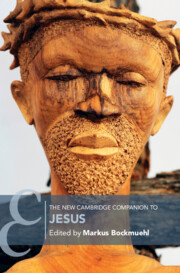Book contents
- The New Cambridge Companion to Jesus
- Cambridge Companions to Religion
- The New Cambridge Companion to Jesus
- Copyright page
- Contents
- Contributors
- Acknowledgements
- A Note on Referencing and Abbreviations
- Introduction
- Part I Origins
- 1 Life and Aims of Jesus
- 2 Jesus’s Religion, Praxis, and Experience of God
- 3 Jesus in the Fourfold Gospel
- 4 Paul’s Jesus as the Christ
- 5 The Risen Jesus
- 6 Jesus and the Triune God
- 7 Jesus in the Scriptures of Israel
- Part II The Diversity of Reception
- Part III Ethics, Theology, and Critical Scholarship
- Part IV The Global Jesus Today
- Part V Outlook
- Bibliography
- Ancient Sources Index
- Subject Index
- Cambridge Companions to Religion
- References
6 - Jesus and the Triune God
from Part I - Origins
Published online by Cambridge University Press: 15 November 2024
- The New Cambridge Companion to Jesus
- Cambridge Companions to Religion
- The New Cambridge Companion to Jesus
- Copyright page
- Contents
- Contributors
- Acknowledgements
- A Note on Referencing and Abbreviations
- Introduction
- Part I Origins
- 1 Life and Aims of Jesus
- 2 Jesus’s Religion, Praxis, and Experience of God
- 3 Jesus in the Fourfold Gospel
- 4 Paul’s Jesus as the Christ
- 5 The Risen Jesus
- 6 Jesus and the Triune God
- 7 Jesus in the Scriptures of Israel
- Part II The Diversity of Reception
- Part III Ethics, Theology, and Critical Scholarship
- Part IV The Global Jesus Today
- Part V Outlook
- Bibliography
- Ancient Sources Index
- Subject Index
- Cambridge Companions to Religion
- References
Summary
This chapter considers the ways in which the classical credal and conciliar formulae provide a framework for understanding who Jesus Christ is and how God saves through the Incarnate Word. These credal and conciliar formulae provide the foundation for theologies across the spectrum of Christian traditions. The chapter is broadly divided into two sections, one focusing on the fourth century Trinitarian controversies, the second focusing on the christological controversies of the fifth to the seventh centuries. For classical Christian theology, only when Jesus is known as the Word made flesh, and as one coequal to Father and Spirit in the divine life, can the work of redemption be understood.
- Type
- Chapter
- Information
- The New Cambridge Companion to Jesus , pp. 88 - 102Publisher: Cambridge University PressPrint publication year: 2024

